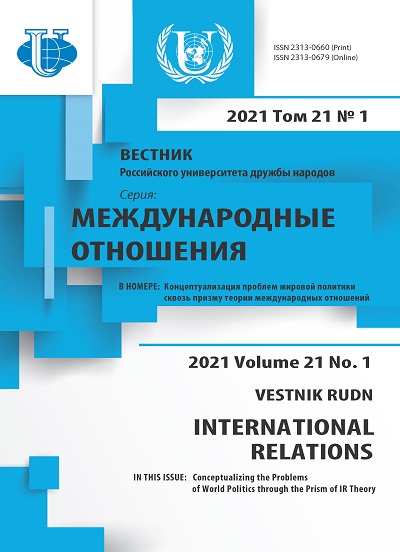BRICS Countries in International Climate Policy
- 作者: Kovalev Y.Y.1, Porshneva O.S.1
-
隶属关系:
- Ural Federal University named after First President of the Russian Federation B.N. Yeltsin
- 期: 卷 21, 编号 1 (2021): Conceptualizing the Problems of World Politics through the Prism of IR Theory
- 页面: 64-78
- 栏目: THEMATIC DOSSIER
- URL: https://journals.rudn.ru/international-relations/article/view/25957
- DOI: https://doi.org/10.22363/2313-0660-2021-21-1-64-78
如何引用文章
全文:
详细
The article presents an analysis of the BRICS countries’ climate policies at the global and national levels. The authors consider the positions of these states within the framework of both international climate conferences (Conference of the Parties) held under the auspices of the UN since 1992, and the summits of BRICS member states in the years 2011-2020. The paper covers strategies and results of national climate policies implemented in these countries. Using structural, comparative, and content analysis methods, the authors emphasize that BRICS countries play a key role in stabilizing the climate of our planet today. It is impossible to achieve the main aim of the Paris Agreement without a comprehensive transformation of environmental practices in these societies. BRICS adheres to the principle of “common but differentiated responsibilities” in its position towards international climate policy; the BRICS countries stand for sustainable economic growth through the introduction of new environmental technologies, and against restrictive measures that impede their economic development. At the same time, the Russian economy’s dependence on the extraction and export of fuel resources complicates environmental transformation. Russia is dominated by a negative narrative of climate change, where the urgent ecological modernization of the economy is seen as a threat to key sectors (oil and gas) of the economy. The implementation of international agreements to reduce the carbon intensity of the Russian economy, the creation of conditions for the transition to climate-neutral technologies, would contribute not only to the fight against global climate change, but would become a powerful incentive for the modernization of the economy, accelerating innovation and increasing its competitiveness.
作者简介
Yuri Kovalev
Ural Federal University named after First President of the Russian Federation B.N. Yeltsin
编辑信件的主要联系方式.
Email: yykowaljow@gmail.com
PhD in Geographical Sciences, Associate Professor, Chair of Theory and History of International Relations, Department of International Relations, Ural Humanitarian Institute
Yekaterinburg, Russian FederationOlga Porshneva
Ural Federal University named after First President of the Russian Federation B.N. Yeltsin
Email: porshneva@yandex.ru
PhD, Dr. of Sc. (History), Professor, Head, Department of Theory and History of International Relations, Ural Humanitarian Institute
Yekaterinburg, Russian Federation参考
- Brütsch, C., & Papa, M. (2013). Deconstructing the BRICS: Bargaining Coalition, Imagined Community, or Geopolitical Fad? The Chinese Journal of International Politics, 6(3), 299—327. doi: 10.1093/cjip/pot009
- Downie, C., & Williams, M. (2018). After the Paris Agreement: What Role for the BRICS in Global Climate Governance? Global Policy, 9(3), 398—407. doi: 10.1111/1758-5899.12550
- Gebauer, S. (2017). China und andere Schwellenländer. In G. Simonis (Eds.), Handbuch Globale Klimapolitik. Padeborn: UTB (pp. 377—397). (In German).
- Gladun, E., & Ahsan, D. (2016). BRICS Countries’ Political and Legal Participation in the Global Climate Agenda. BRICS Law Journal, 3(3), 8—42. doi: 10.21684/2412-2343-2016-3-3-8-42
- Gupta, J. (2014). The History of Global Climate Governance. Cambridge: Cambridge University Press. doi: 10.1017/CBO9781139629072
- Hein, W., Betz, J., Eucker, D., Hein, J., Holstenkamp, L., & Neve, B. (2017). Klimapolitik und Entwicklung. In G. Simonis (Eds.), Handbuch Globale Klimapolitik. Padeborn: UTB (pp. 397—441). (In German).
- Jahrmarkt, L. (2016). Internationales Klimaschutzrecht: Der Weg Zu Einem Weltklimavertrag Im Sinne Gemeinsamer, Aber Differenzierter Verantwortlichkeit. Baden-Baden: Nomos. (In German).
- Kovalev, Yu.Yu. (2018). “Green Economy” and the Ecological Modernization of China’s Economy. In N.A. Sluka (Eds.), On the way to Pax Siniса. Мoscow: Izdatel’stvo MGU im. M.V. Lomonosova publ. (pp. 145—159). (In Russian).
- Larionova, M.V. (2015). South Africa’s BRICS Presidency: Regional Power at the Helm of a Global Governance Forum. Vestnik RUDN. International Relations, 15(1), 125—134. (In Russian).
- Larionova, M.V. (2016). Russian BRICS Presidency: Models of Engagement with International Institutions. International Organisations Research Journal, 11(2), 113—139. (In Russian). doi: 10.17323/1996-7845-2016-02-113
- Larionova, M.V. (2018). The G20, BRICS and APEC in the System of International Institutions: A Piece of Good News for Global Governance. International Organisations Research Journal, 13(1), 7—33. (In Russian). DOI: 10.17323 / 1996-7845-2018-01-01
- Leal-Arcas, R. (2013). The BRICS and Climate Change. International Affairs Forum, 4(1), 22—26. doi: 10.1080/23258020.2013.824246
- Otto, D. (2017). Entstehung und Ausdifferenzierung des UN-Klimaregimes. In G. Simonis (Eds.), Handbuch Globale Klimapolitik. Padeborn: UTB (pp. 260—301). (In German).
- Popova, I.M. (2018). Brazil’s 2019 BRICS Presidency: What to Expect from the Start of a New Decade of Cooperation and the J. Bolsonaro’s Administration. Vestnik RUDN. International Relations, 18(4), 925—941. (In Russian). doi: 10.22363/2313-0660-2018-18-4-925-941
- Reimer, N. (2015). Schluss-Konferenz. Geschichte und Zukunft der Klimadiplomatie. München: Oecom Verlag. (In German).
- Rusakova, Y.A. (2016). Problems of International Environmental Security and Search for Diplomatic Ways to Overcome Them at the Present Stage (Case of Contemporary Negotiations on Climate) [thesis]. Moscow: MGIMO University. (In Russian).
- Safonkina, E.A. (2017). India’s 2016 BRICS Presidency. Asia and Africa Today, (7), 15—20. (In Russian).
- Safonkina, E.A. (2018). Chinese 2017 BRICS Presidency: Expanding Cooperation Horizons. Vestnik RUDN. International Relations, 18(2), 356—367. (In Russian). doi: 10.22363/2313-0660-2018-18-2-356-36
- Schubert, T. (2019). Eine analytische Betrachtung der Klimapolitik in Südafrika: Instrumente zur Förderung des Ausbaus erneuerbarer Energien. Stuttgart: Fraunhofer Verlag. (In German).
- Simonis, G. (Eds.). (2017). Handbuch Globale Klimapolitik. Paderborn: UTB. (In German).
- Stahl, B. (2020). Internationale Politik verstehen. Opladen & Toronto: Verlag Barbara Budrich. (In German).
- Su, B., Heshmati, A., Geng, Y., & Yu, X. (2013). A Review of the Circular Economy in China: Moving from Rhetoric to Implementation. Journal of Cleaner Production, (42), 215—227. doi: 10.1016/j.jclepro.2012.11.020








